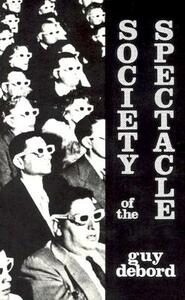You need to sign in or sign up before continuing.
Take a photo of a barcode or cover
Despite being written in the 1960's this book feels very current. It's depiction of a world where even time is commodified and where we are all in thrall to alienated images built to bind us into the class relations that underpin the modern world, fits well with our world of 'reality' television and celebrity. A world in which the abundance delivered by capitalism remains under the control of existing property relations, and as a result the majority of us remain dominated by the 'machinery of modern consumption'. Things have only accelerated since this book was written.
In some ways this book is part of the "rediscovery" of Hegelian Marxism. Certainly it emphasises dialectical analysis and the 'humanist' side of Marx, the need for us to take control of our own future and create a world where we are connected to, rather than separated from, reality. It also emphasises the importance of the eleventh thesis on Feuerbach: "Philosophers have only interpreted the world, the point is to change it". We can only understand how to theorise about how the world should change by actively seeking to change it.
It shows an open antipathy to Stalinism specifically and to 'standard' soviet communism in general, and there is an interesting critique of the communism of bolshevism and the second international. While this probably felt radical in the 1960's when the book was written, 27 years after the collapse of the Soviet Union it feels more routine. We have moved beyond the opposition to capitalism consisting only of a single monolithic alternative state, and in that sense this book feels ahead of it's time.
Despite it's association with the situationist movement in art, it is in fact the sections on art which feel least successful, the most over-intellectualised. While it makes good points about the commodification of art from across history, it is unclear what a more 'real' art, one less in thrall to the status quo, might be composed of or how it will come about.
That said this is a fascinating reflection on the impact of modern consumer capitalism on contemporary culture, and no less relevant to today for being 50 years old.
https://wp.me/p3MNIt-G7
In some ways this book is part of the "rediscovery" of Hegelian Marxism. Certainly it emphasises dialectical analysis and the 'humanist' side of Marx, the need for us to take control of our own future and create a world where we are connected to, rather than separated from, reality. It also emphasises the importance of the eleventh thesis on Feuerbach: "Philosophers have only interpreted the world, the point is to change it". We can only understand how to theorise about how the world should change by actively seeking to change it.
It shows an open antipathy to Stalinism specifically and to 'standard' soviet communism in general, and there is an interesting critique of the communism of bolshevism and the second international. While this probably felt radical in the 1960's when the book was written, 27 years after the collapse of the Soviet Union it feels more routine. We have moved beyond the opposition to capitalism consisting only of a single monolithic alternative state, and in that sense this book feels ahead of it's time.
Despite it's association with the situationist movement in art, it is in fact the sections on art which feel least successful, the most over-intellectualised. While it makes good points about the commodification of art from across history, it is unclear what a more 'real' art, one less in thrall to the status quo, might be composed of or how it will come about.
That said this is a fascinating reflection on the impact of modern consumer capitalism on contemporary culture, and no less relevant to today for being 50 years old.
https://wp.me/p3MNIt-G7
Judged by the standards of analytical philosophy (whereby one might expect Debord to occasionally offer some empirical evidence for his assertions, justify his underlying romantic longing for a lost state whereby man could 'directly' live 'true experiences', and rely less on vague statements about what 'History' has been up to lately) this is a bit rubbish. Judged as a work of fiction, which I increasingly think is how all philosophy should be read anyway, it's quite entertaining, with a nice line in absurd metaphors.
challenging
informative
reflective
slow-paced
This book is a little hard to read as some parts Debord was extremely articulate, but in others I found I was re-reading parts to get a good enough grasp on what he was trying to communicate. It is a thought provoking perspective of the world we live in.
challenging
informative
reflective
slow-paced
challenging
informative
reflective
fast-paced
challenging
informative
slow-paced
medium-paced
challenging
informative
reflective
fast-paced
challenging
informative
slow-paced
informative
reflective
sad
fast-paced





